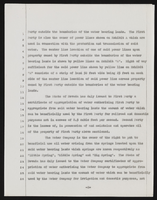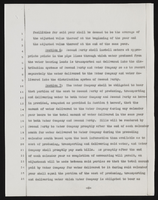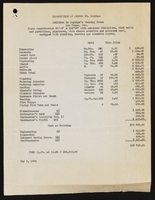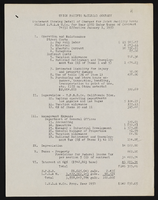Search the Special Collections and Archives Portal
Search Results
Las Vegas City Commission Records
Identifier
Abstract
The Las Vegas City Commission Records (1911-1960) is comprised of bound and unbound materials from the original Las Vegas City Commission. Twelve of the bound volumes are minutes that served as the official record of the proceedings of all Las Vegas City Commission meetings from 1911-1960. There are also three volumes of City of Las Vegas ordinances dating from 1911 to 1958, one volume of legal documents from 1944-1945 and two large volumes containing an alphabetical subject index to the topics covered in the minutes. Unbound materials cover the period 1921 to 1946 and include minutes, resolutions, ordinances, correspondence, financial records, proclamations and other documents related to city business. They provide a valuable historical record of a wide variety of business and community activities in Las Vegas in the first fifty years of its incorporation.
Archival Collection
Greenpeace Pacific Southwest Records
Identifier
Abstract
The Greenpeace Pacific Southwest Records are comprised of files and documents pertaining to environmental activism in Southern Nevada from 1962 to 1994, primarily addressing the organization of protests at the Nevada Test Site. The collection contains newspaper articles, newsletters, publications, financial records, protest information, correspondence, meeting minutes, articles of incorporation, Freedom of Information Act requests, and Nevada Test Site information. Also contained in the collection are maps and documents related to various environmental issues such as nuclear waste, land use, wildlife protection, and international environmental activism.
Archival Collection
Nellis Air Force Base Photograph Collection
Identifier
Abstract
The Nellis Air Force Base Photograph Collection contains photographs of Nellis Air Force Base and its predecessor, the Las Vegas Army Airfield, as well as photographs of Rockwell Field and McCarran Airport in Las Vegas, Nevada from 1926 to 1980. The materials contain photographs of military aircraft, hangars, buildings on the base, and aerial photographs of Las Vegas and the surrounding area. The materials also include photographs of the entrance of McCarran Airport, U.S. Senator Pat McCarran, and a mail plane arriving at Rockwell Fields in 1926.
Archival Collection
Urban Chamber of Commerce of Las Vegas, Nevada Records
Identifier
Abstract
The Urban Chamber of Commerce of Las Vegas, Nevada Records date from approximately 1980 to 2009 and contains the organizational records of the Urban Chamber of Commerce of Las Vegas, Nevada (UCC), one of the many chambers of commerce in the Las Vegas, Nevada area. The mission of the Urban Chamber of Commerce is to create and foster an environment that promotes development of members and Black-owned businesses. The collection is comprised of publications, financial and administrative records, various event information, and photographs of events and membership.
Archival Collection
Equal Rights Nevada Collection
Identifier
Abstract
The Equal Rights Nevada (2000-2002) collection is comprised of organizational records documenting the group’s unsuccessful fight against Question 2, a referendum voted upon in 2000 and 2002 to amend Nevada’s state constitution to forbid same-sex marriage. It includes campaign files, financial records, publicity, correspondence, ephemera, and other supporting documentation from national and regional marriage equality organizations.
Archival Collection

Joseph Ostunio oral history interview: transcript
Date
Archival Collection
Description
Oral history interview with Joseph Ostunio conducted by Claytee D. White on December 20, 2017 for the Remembering 1 October Oral History Project. In this interview, Joseph Ostunio discusses his early childhood in Las Vegas, Nevada and how he grew to love country music. He talks about the Route 91 Harvest music festival, which he attended with his friend in 2017. He describes the events of that weekend and the shooting on that Sunday, October 1, 2017, during which his friend was shot. Ostunio ends the interview with his feelings regarding Las Vegas and what he has learned about himself from this experience.
Text




